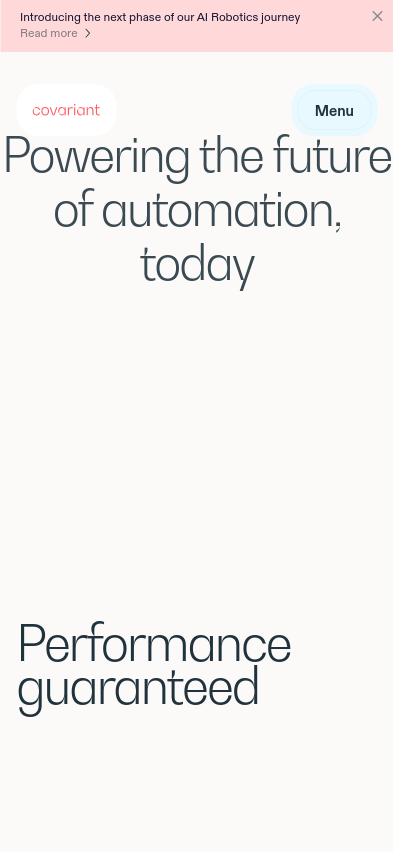⚡ZurzAI.com⚡
AI Start Ups Your Should Know
Covariant

Covariant develops AI-powered robotics for warehouse automation, enhancing operational efficiency with advanced machine learning and universal AI capabilities.
Covariant, specializing in AI Robotics, is exploring new frontiers by leveraging the Covariant Brain, a universal AI platform designed to enhance robotic automation in warehouse operations. This platform augments the capacity of robots to perform tasks with human-like autonomy, trained on vast datasets of multimodal warehouse interactions. Below is an overview of Covariant's AI advancements, partnerships, and research efforts.
Covariant's AI Innovations and Capabilities:
- Covariant Brain: The platform is designed to facilitate robots to pick any item or SKU from Day One, and is equipped for multiple picking use cases. It employs a universal AI, powered by RFM-1 and fleet learning to continuously enhance performance.
- RFM-1 Technology: This Robotics Foundation Model is developed from both internet data and real-world physical interactions. It epitomizes Covariant’s commitment to building robots capable of interacting autonomously with their environment, tackling industry challenges effectively.
- AI-Fueled Versatility: With pre-training on a massive dataset, Covariant Brain is trained to manage a wide array of warehouse tasks, like surface picking, order sorting, and more.
Key Projects and Partnerships:
- Radial's Automation: Covariant has partnered with Radial to implement automated systems in handling batch-picked items in eCommerce settings, effectively alleviating labor shortages and enhancing sorting efficiency.
- Collaborations with Major Fulfillment Companies: Covariant has secured agreements with prominent global firms, including Amazon, for non-exclusive licenses to their Robotics Foundation Models.
- Broader Industry Applications: The Covariant Brain is used in diverse industry segments, including health, beauty, apparel, and grocery, offering solutions that integrate into existing workflows seamlessly.
Research and Development:
- Innovation in Robotics Foundation Models: RFM-1 is foundational to Covariant’s vision for integrating AI with real physical world tasks. Current efforts are centered on targeting long-tail events and refining the model through continuous data acquisition.
- AI and Human-Like Reasoning: RFM-1 positions itself with an ability to simulate real-world actions and make decisions dynamically, comparable to advancements seen in models such as GPT for digital domains.
Future Prospects and Expansion:
- AI's Role in Warehouse Operations: As the AI landscape grows, Covariant aims to expand its technology to deliver more adaptable, autonomous robotic solutions for a range of operational environments.
- Enhanced Data Utilization: The company continues to collect and harness data across its robotic fleets worldwide, aiming to improve the scalability and capability of its robotic systems.
- Strategic Industry Alignment: By aligning with significant AI trends, such as reinforcement learning and robust model training, to tackle physical world complexities, Covariant aims to spearhead an AI revolution in warehouse and logistics operations.
Leadership and Governance: Following a collaborative agreement with Amazon, the company's leadership transitioned, with Ted Stinson and Tianhao Zhang taking pivotal roles to lead the firm into its next phase.
Through these myriad initiatives, Covariant seeks to redefine AI's role in industrial applications, focusing on building robust, versatile, and autonomous robotic solutions. This promise of transformation reveals the potential for AI to overhaul traditional labor-intensive processes by enhancing efficiency and responsiveness across multiple industry sectors.